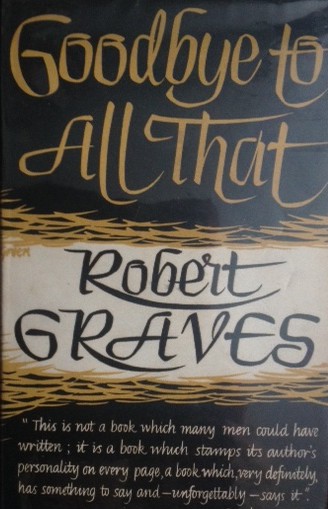Inspiring Older Readers
 posted on 03 Apr 2018
posted on 03 Apr 2018
Goodbye To All That by Robert Graves
I should say from the outset that this is a review of the revised second edition of Graves’ autobiography that was released in 1957 – eighteen years after the first version was published. This is significant because this second edition is, I understand, substantially different from the original with sections that have been completely rewritten, parts that have been removed and others added. Several commentators believe that the first draft has a rough authenticity that has been smoothed out of the second draft but, from what I can gather, the central portion which deals with trench life in the First World War is substantially the same.
Either way, Graves, who was only 33 when he wrote the original, has an engaging style and a sort of sardonic persona that is astonishingly readable. He opens the book with a coruscating indictment of public school life – and Charterhouse in particular gets a hammering. The bullying he suffered makes you wonder why on Earth anyone would send their child off to suffer in this way. But, he recognises, this is all part of the class system he benefits from and which would shape his early years. Inclined to religion and priggish morality, Graves comes across as unworldly and naïve. Definitely not someone suited to being plunged into the mayhem of the slaughterhouse that was the Great War.
At a time when the hundred year anniversary of that war’s final year is focussing attention on the aims and conduct of the conflict and revisionist historians are seeking to justify and rewrite the conduct of those who sent thousands to their early death, Graves’ fearless description of what it meant to be in the trenches is a timely read.
Some of the set piece descriptions of battles that are almost unadulterated chaos are visceral. Living with lice and rats that eat any dead bodies and fight over dismembered hands doesn’t make for easy reading but the extraordinary valour and acts of astonishing humanity can’t help but impress. Company commanders prepared to walk out into no-man’s land with nothing but a white handkerchief in order to rescue one wounded soldier takes the breath away.
It always seems to be true in war situations that bureaucratic incompetence threatens lives and this war was no exception. The description of the British attempt to deploy poison gas as cover for an attack on the German lines would be funny if it wasn’t so tragic.
Graves was eventually badly wounded by a shell that exploded only yards from where he stood with shrapnel entering his upper thigh, his lungs and shattering a finger. His wounds were so terrible that it was assumed he would die and a letter was sent home regretting his death in action. In fact he survived and was sent back to England to recuperate but once there he found he was living in a country he didn’t recognise – unrealistic war jingoism made it impossible for him to bear reading newspapers or even talking to his family. Although he tried to return to the frontline his lungs were too weak and he also succumbed to Spanish flu which gave him another flirtation with death.
The book also deals with some of his development as a poet and his relationship with Siegfried Sassoon who became a close friend and advisor. He met pretty much all of the significant poets of the time and even spent a day with Thomas Hardy, by that time a grand old man of the literary scene.
There is an interesting section towards the end that deals with his relationship with T.E.Lawrence ( Lawrence of Arabia) but the veracity of this section is, I suspect, uncertain because it was completely rewritten in this new version and Graves doesn’t really make it very clear just why and what the changes are.
After the publication of the original draft in 1929 Graves, with his demons down on paper, headed off to teach in Cairo – a destination recommended for the health of his wife. We discover that this marriage doesn’t last and Graves would eventually head off to live on the island of Majorca:
“The remainder of this story, from 1926 until today, is dramatic but unpublishable. Health and money both improved, marriage wore thin. New characters appeared on stage. Nancy and I said unforgivable things to each other. We parted on May 6th 1929. She, of course, insisted on keeping the children. So I went abroad, resolved never to make England my home again; which explains the ‘Goodbye to all that’ title.”
Much of Graves’ more famous work – I Claudius and his work on Norse and pagan mythology – was still to come but I suspect this book will stand as his masterpiece. Once I started reading it I just couldn’t stop and one of the best things I can tell you about it is that I woke at 6.00am on two consecutive mornings to continue reading. I consider that’s praise indeed.
Terry Potter
April 2018